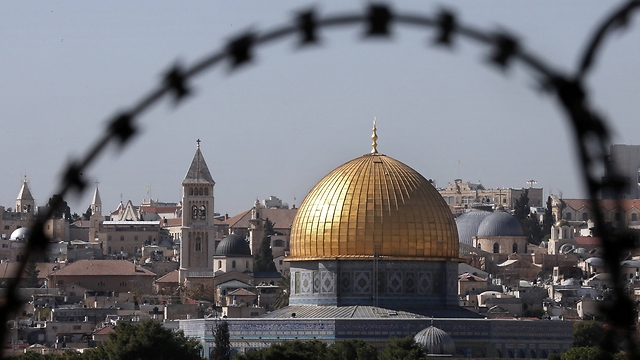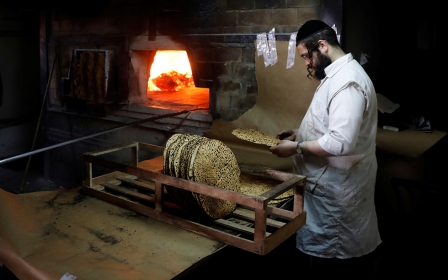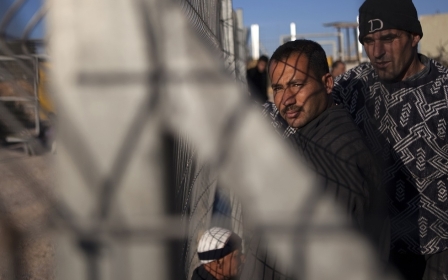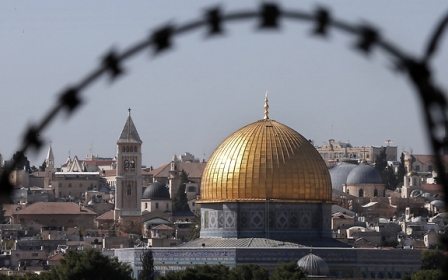Israel imposes eight-day ban on Palestinians for Passover holiday

Palestinians are bracing for a crackdown on their freedom of movement after Israel announced eight days of border restrictions during the Jewish Passover holiday.
As of Thursday night, Israeli forces will prevent Palestinians with permits from entering Israel and the annexed East Jerusalem. There are exceptions for humanitarian and medical cases, official Palestinian news agency Wafa reported earlier this week.
But the measures will affect the livelihood of the estimated 70,000 Palestinians with permits to work in Israel, as well as thousands of Palestinians working illegally in Israel due to lack of jobs in occupied Palestinian territories. Many of these workers have already been targeted by Israeli police in the past week.
Palestinians who have non-work permits to Israel will also be barred, as will Palestinian women over 50 and Palestinian men over 55 from the West Bank – who can usually visit Israel and East Jerusalem without a permit.
Nabil Shaath, the Palestinian presidential adviser on international affairs, told Middle East Eye that such closures caused "grave economic and social harm" to Palestinians.
Israel commits a further violation to its obligations as the occupying power under international humanitarian law
- Nabil Shaath, Palestinian presidential adviser
"The permit and closure regime imposed by Israel is illegal," he said. “We should be able to freely access all of our country, including East Jerusalem. Rather, the regime is a mechanism of oppression.
"By imposing this closure, Israel commits a further violation to its obligations as the occupying power under international humanitarian law."
Israeli forces have also reinforced security in East Jerusalem’s Old City, where Jewish worshippers are expected to come in higher numbers for Passover, which marks the Biblical Jewish exodus from ancient Egypt.
Jewish holidays often lead to heightened tensions in the city as far-right Jewish Israelis, known as "Temple Mount activists" often breach agreements regarding non-Muslim worship at the al-Aqsa Mosque compound.
Israeli police said in a statement on Wednesday that three young Palestinian women had been banned from entering the Old City until June after they were detained over suspicions that they had disseminated Arabic leaflets near al-Aqsa against a ritual sacrifice carried out by "Temple Mount activists" on the outskirts of the compound on Monday.
The first day of Passover also coincides this year with Land Day on 30 March, the annual Palestinian holiday denouncing the Israeli takeover of Palestinian lands.
Numerous demonstrations are planned across the occupied Palestinian territory and Israel that day, leading to fears that increased Israeli security, compounded by the beginning of Passover, could lead to violence.
Jewish holidays have regularly been used as a pretext by Israeli forces to limit Palestinian movement, occasionally for long stretches of time. In October, Israeli forces imposed an 11-day closure on the occasion of the holiday of Sukkot.
Shaath rejected the Israeli argument that such restrictions were imposed as a security measure.
“In effect, Israeli measures have little to do with Israel’s security, and a lot to do with the security of the occupation, the perpetuation of an apartheid regime, and the impossibility of the existence of a free State of Palestine with East Jerusalem as its capital,” he said.
New MEE newsletter: Jerusalem Dispatch
Sign up to get the latest insights and analysis on Israel-Palestine, alongside Turkey Unpacked and other MEE newsletters
Middle East Eye delivers independent and unrivalled coverage and analysis of the Middle East, North Africa and beyond. To learn more about republishing this content and the associated fees, please fill out this form. More about MEE can be found here.




